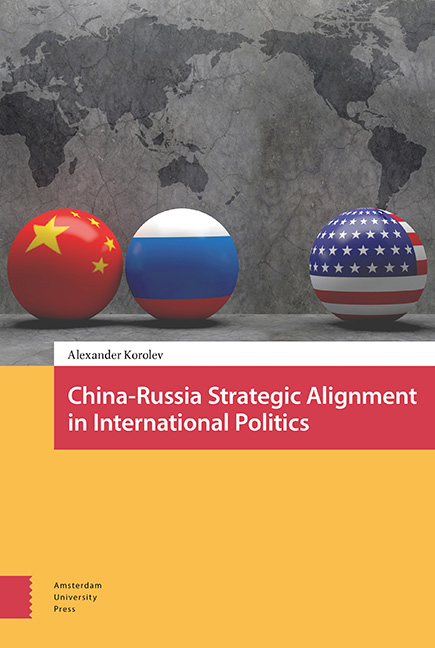Book contents
- Frontmatter
- Dedication
- Table of Contents
- List of Figures and Tables
- Acknowledgments
- 1 Introduction: The Elusive Nature of China–Russia Relations and the Need for Theory
- 2 The Ordinal Model of Strategic Alignment
- 3 Military Cooperation: Approaching Alliance
- 4 Alignment Incentives: The Three Balances
- 5 Robustness Check: Economy and Diplomacy
- 6 Comparative Mapping: US–India and China–Russia Alignments
- 7 Conclusion: Empirical Findings and Theoretical Implications
- Index
5 - Robustness Check: Economy and Diplomacy
Published online by Cambridge University Press: 07 October 2022
- Frontmatter
- Dedication
- Table of Contents
- List of Figures and Tables
- Acknowledgments
- 1 Introduction: The Elusive Nature of China–Russia Relations and the Need for Theory
- 2 The Ordinal Model of Strategic Alignment
- 3 Military Cooperation: Approaching Alliance
- 4 Alignment Incentives: The Three Balances
- 5 Robustness Check: Economy and Diplomacy
- 6 Comparative Mapping: US–India and China–Russia Alignments
- 7 Conclusion: Empirical Findings and Theoretical Implications
- Index
Summary
Abstract
The military-security dimension of alignment has the highest bar for cooperation. However, empirical assessments of alignments often move beyond it to include the economic and diplomatic spheres. This chapter assesses economic and diplomatic cooperation as a robustness check on the comprehensiveness of China–Russia cooperation's upward trend. In its discussion of economic cooperation, it attempts to unpack the geopolitical pressures generated by the economic cooperation model and assess its impact on China–Russia alignment. With regards to diplomatic cooperation, the emphasis is on the patterns of China's and Russia's voting behavior in the United Nations Security Council and their activities within other regional international institutions. The chapter shows that bilateral cooperation in non-military dimensions is not yet as strong. However, it has steadily improved.
Keywords: China–Russia alignment, economic cooperation, diplomatic Cooperation
The analysis below explores China–Russia economic and diplomatic cooperation. When assessing economic cooperation, it uses quantitative indicators, such as the volume of bilateral trade and its share in each country's total external trade. It also looks at the composition of China–Russia trade and how it has changed since the end of the Cold War. Particular emphasis is placed on the model of economic cooperation, the roles China's and Russia's economies play in it, and the geopolitical implications it generates from the standpoint of strategic alignment. The below analysis also assesses the degree of diplomatic cooperation by exploring China–Russia voting behavior in the United Nations Security Council (UNSC) and the agendas of China–Russia cooperation in regional formats.
Economic cooperation: trade, unequal interdependence, and new Initiatives
Since the beginning of the Policy of Reforms and Opening in 1978, China has been much more successful economically than post-Soviet Russia. The difference between China's and Russia's economic transition experiences manifests itself most remarkably in the growing gap between the size of the countries’ economies as expressed by GDP. In 2013 the ratio of China's to Russia's total GDP was 4.3:1, calculated in current dollars based on the market exchange rate, and 4.5:1, based on purchasing power parity (PPP)-adjusted estimates. By 2016, these ratios became 8.7:1 and 5.6:1, respectively. Meanwhile, Russia's to China's per capita GDP ratio in 2013 was 2.2:1. However, in 2016 it became 1.1:1, which means that China's per capita GDP is almost on par with Russia's – a rather devastating outcome for Russia, given the two countries’ demographic parameters.
- Type
- Chapter
- Information
- China-Russia Strategic Alignment in International Politics , pp. 129 - 156Publisher: Amsterdam University PressPrint publication year: 2022



